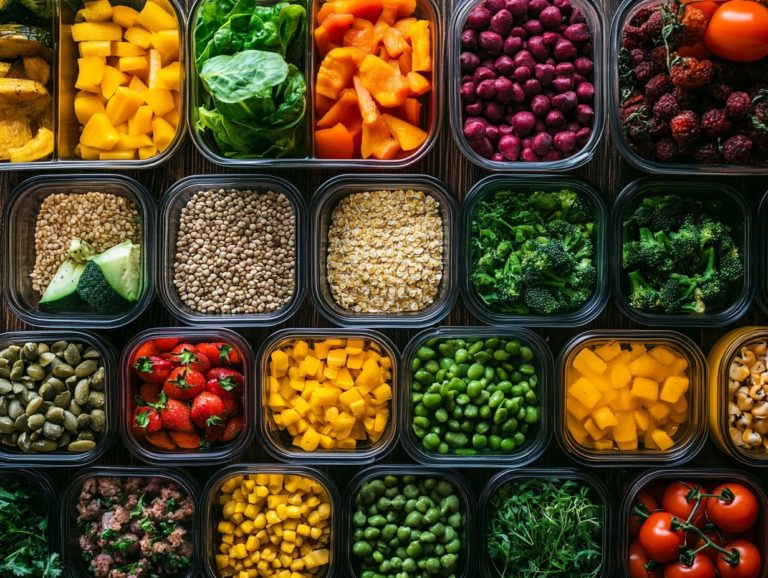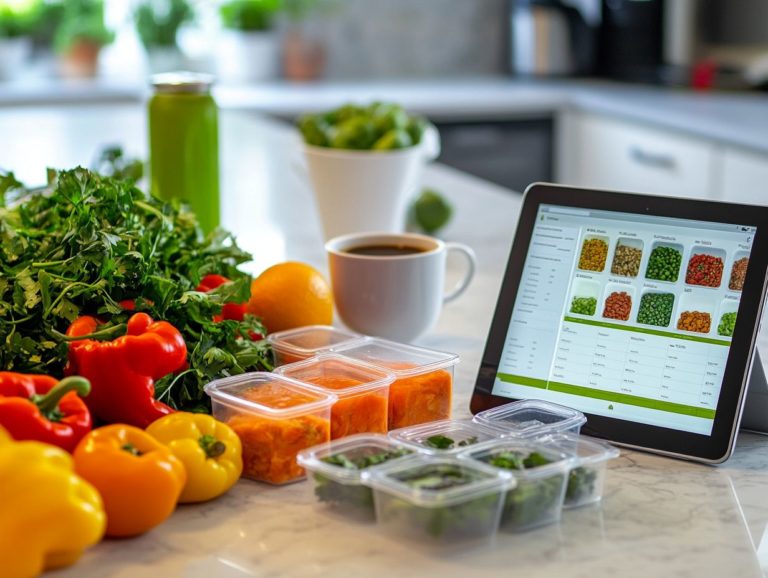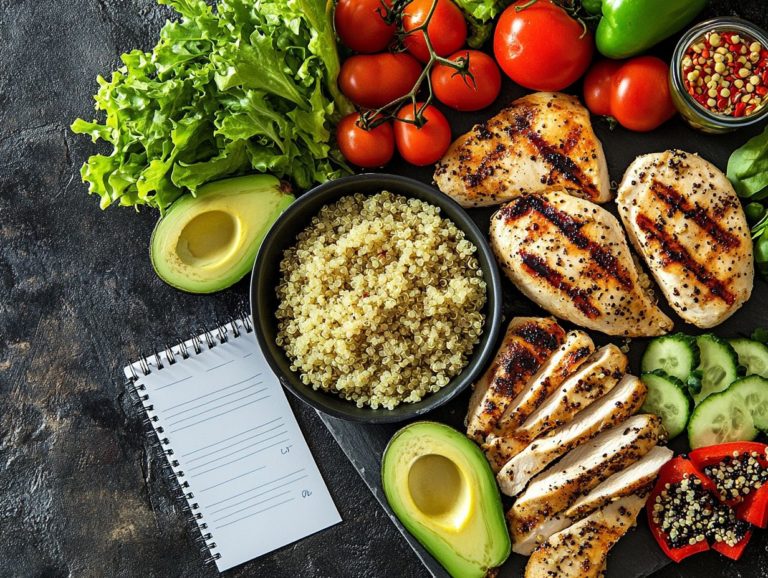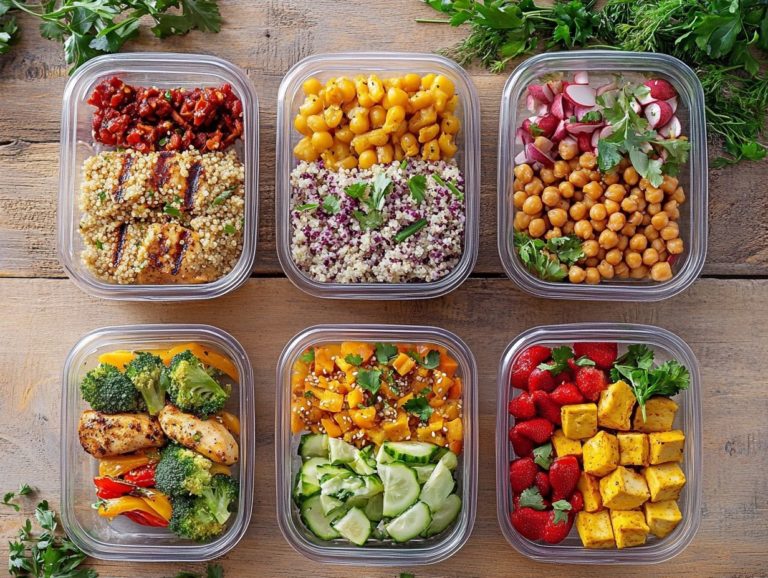How to Plan Meals for a Busy Week
Meal planning has the potential to revolutionize your dining experience, particularly during those hectic weeks when time seems to slip away.
By organizing your meals in advance, you not only save precious time but also cut down on expenses, all while savoring delicious, home-cooked dishes. This article delves into the myriad benefits of meal planning, from crafting efficient shopping lists to implementing smart meal prep strategies like batch cooking and freezing.
You ll discover tips for quick recipes, creative uses for leftovers, and how to accommodate specific dietary needs. Prepare to streamline your week and rediscover the joy of mealtime!
Contents
Key Takeaways:
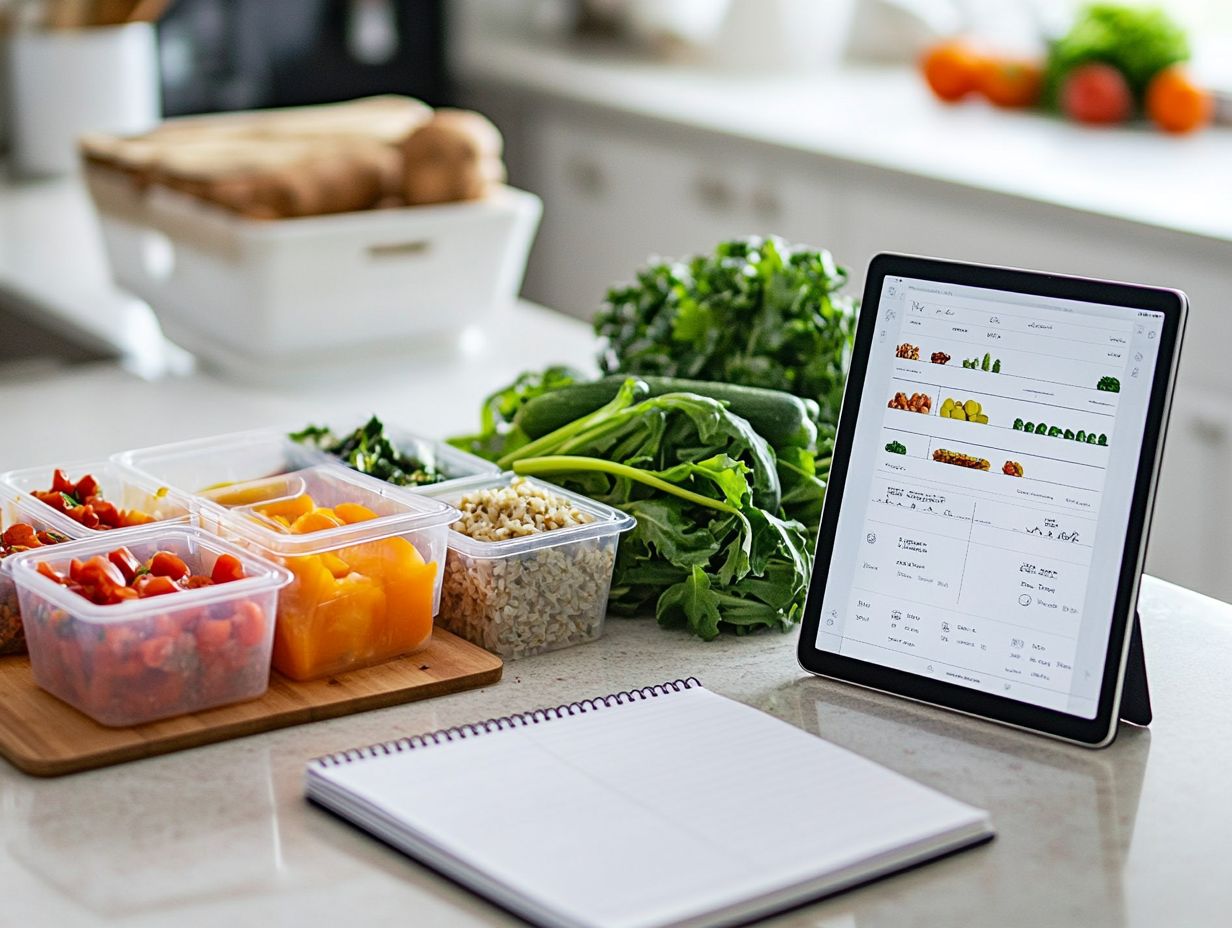
Meal planning can save time and money while also promoting healthier eating habits. Factors such as budget, schedule, and dietary preferences should be considered when creating a meal plan. Utilizing the best meal planning strategies for beginners and incorporating quick and easy recipes can help simplify meal planning for busy weeks.
Benefits of Meal Planning
Meal planning presents a wealth of advantages for busy parents and stay-at-home moms who aim to streamline their routines while focusing on nutritious, homemade meals.
By organizing meals ahead of time, families can indulge in a diverse array of delicious, healthy snacks and comforting dishes that satisfy everyone’s tastes and dietary needs.
This thoughtful approach not only enhances your food budget but also minimizes food waste.
It also makes grocery shopping more efficient, ensuring you have everything you need without the hassle of extra trips to the store.
Time and Money Savings
Effective meal planning opens the door to significant time and money savings for you and your family. This allows you to budget wisely while enjoying a variety of delicious home-cooked meals.
By embracing strategies like buying large quantities of food to save money, you can take advantage of lower prices on basic foods such as rice, pasta, and canned goods. This approach extends your grocery budget and reduces the need for frequent shopping trips, freeing up valuable time during hectic weeks.
Leveraging digital coupons through various app platforms can amplify your savings with minimal effort. A thoughtfully curated grocery list, rooted in your weekly meal plans, can streamline your shopping experience, helping you avoid impulse buys and ensuring you have all necessary ingredients at your fingertips.
These simple yet effective strategies contribute to a more organized kitchen and, ultimately, a more enjoyable cooking journey.
Creating a Meal Plan
Crafting an effective meal plan demands thoughtful attention to several key factors, such as your family’s dietary preferences, the ingredients at hand, and the time you can dedicate to cooking.
For busy parents like you, balancing a hectic schedule with nutritious meals is crucial. A well-structured meal plan streamlines your grocery shopping while providing a delightful variety of meal ideas and cooking techniques that cater to every family member, from the youngest to the most discerning adult.
Factors to Consider
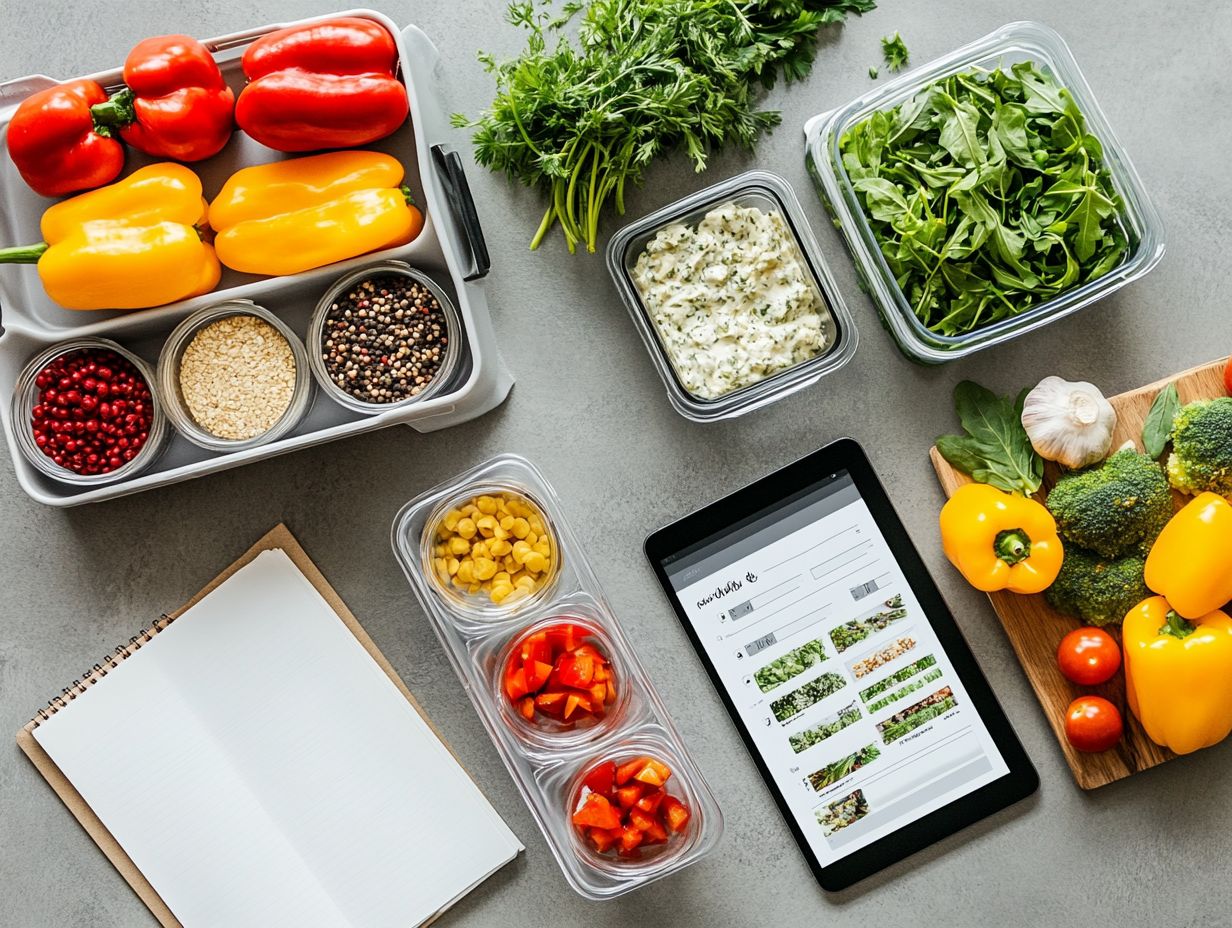
When you re crafting a meal plan, it s essential to consider several factors, including dietary restrictions, food preferences, and your family s overall food budget.
Family size is one of the most important elements to think about. If you have a larger household, you ll likely need to make bulk purchases and opt for simple recipes that please a variety of tastes.
Specific dietary needs, like a peanut allergy, can significantly narrow your options, demanding careful label reading and thoughtful ingredient sourcing.
Budget considerations are also crucial; you ll want to evaluate what you can afford without compromising on nutrition or flavor. Striking a balance here is key.
Finally, achieving meal variety is vital for keeping everyone interested at the dinner table. This ensures that healthy options don t become a monotonous routine.
Meal Prep Strategies
Using meal prep strategies like batch cooking and freezing can change how your family cooks and eats. This ensures that healthy meals are always at your fingertips.
These techniques not only save precious time for busy parents but also spark creativity in the kitchen. Plus, they invite your kids to join in on family cooking activities, cultivating a love for homemade meals and nurturing healthier eating habits.
Start planning your meals today and experience the difference!
Batch Cooking and Freezing
Batch cooking and freezing are your best allies in meal prep. You can prepare larger quantities of food at once, ensuring you have meals ready for hectic dinners or quick lunches.
Cooking in batches saves time and reduces food waste, promoting healthier eating habits with fresh, wholesome ingredients. By organizing the preparation, cooking, and freezing processes, you can streamline weekly meals without sacrificing quality or flavor.
This systematic approach allows you to creatively use leftovers, making new dishes and maximizing every ingredient.
To start, plan your meals for the week by selecting a variety of recipes that complement each other’s ingredients. For effective meal prep, consider following the best practices for weekly meal planning. Choose a day for your culinary preparations. Wash, chop, and portion everything while keeping your cooking space tidy.
Next, dive into batch cooking multiple recipes, considering different cooking times and methods. Let the meals cool before transferring them into airtight containers or freezer bags. This prevents freezer burn and preserves delightful flavors.
Remember to label each container! This will save you time later.
Let your creativity shine with leftovers. Those roasted vegetables could go into a quiche, or any unused grains can become a nourishing salad.
By taking a fresh approach to meal prep, you simplify your cooking routine and enjoy a delightful variety of meals!
Organizing Ingredients and Recipes
Organizing your ingredients and recipes is essential for efficient meal prepping. This allows you to access everything you need quickly and minimizes food waste.
A well-structured kitchen boosts cooking efficiency and ignites creativity in meal preparation.
By categorizing your ingredients grouping spices, dedicating a shelf for canned goods, and storing fresh produce in clear bins you can cut down on time spent searching for items.
Using labeled containers and maintaining a digital or physical recipe book can streamline your cooking process.
Regularly reassess your inventory to ensure nothing goes unused. This makes grocery shopping easy with focused lists reflecting what you truly need for upcoming meals.
An organized kitchen supports healthy eating habits and enhances your overall cooking experience.
Tips for Busy Week Meal Planning
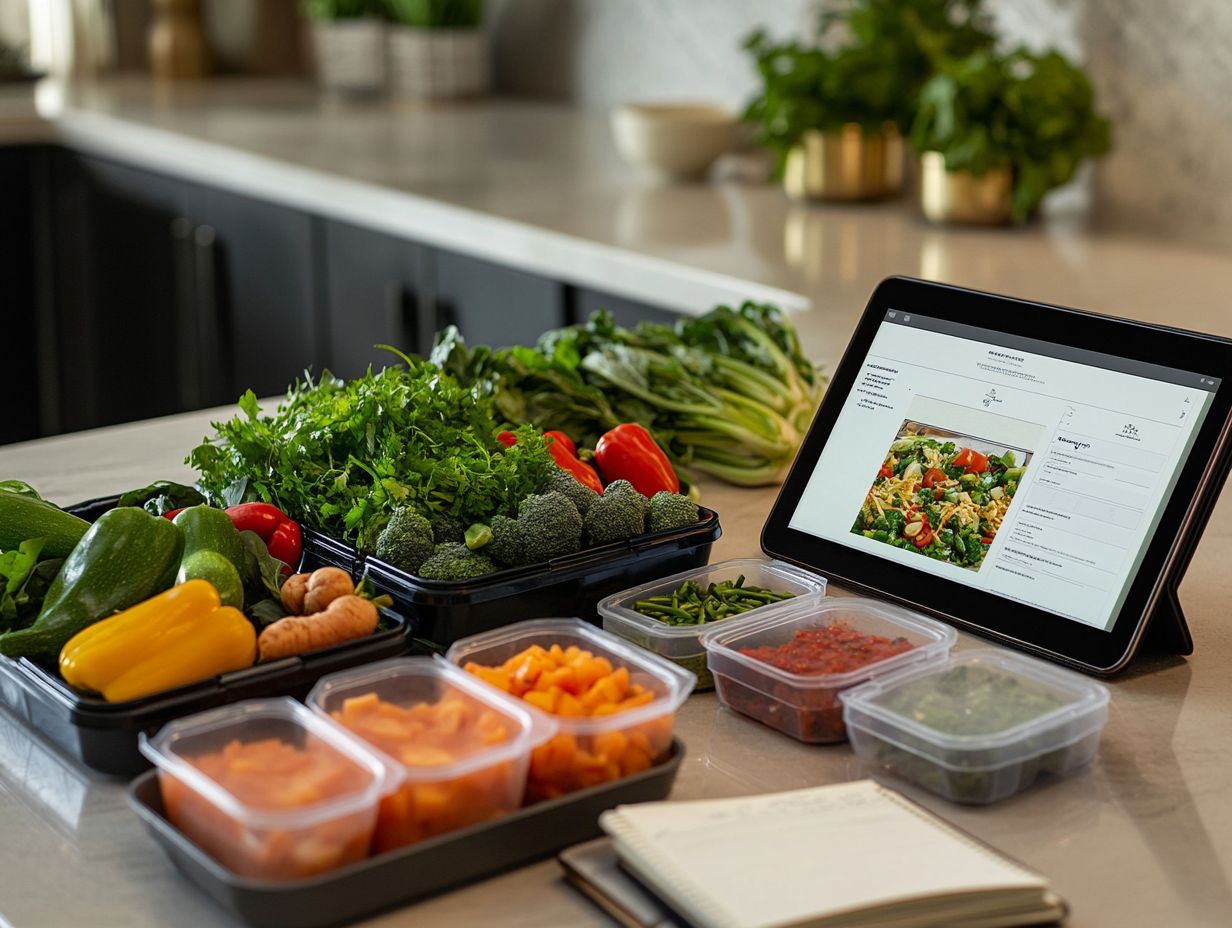
For busy parents juggling hectic schedules, mastering how to plan a week of healthy meals keeps family meals at the forefront, even in chaotic weeks.
By prioritizing quick breakfasts and beloved family favorites, you can easily create stress-free family meals that cater to your children’s needs while maintaining a balanced diet.
Quick and Easy Recipes
Quick and easy recipes are essential for busy families, allowing you to maintain a healthy diet without compromising quality or taste.
With the morning rush often leaving little time for elaborate cooking, consider these simple breakfast options:
- Overnight oats topped with fresh fruits
- A quick smoothie packed with greens and protein
- Scrambled eggs with spinach
- Hearty whole grain toast with avocado
By integrating these uncomplicated meals into your family s morning routine, you save precious time and ensure everyone starts the day with wholesome nutrition served deliciously.
Utilizing Leftovers
Utilizing leftovers creatively can greatly reduce food waste. It also introduces delightful variety to your family meals, transforming yesterday’s dishes into exquisite new creations.
By reimagining these leftovers, you can craft an array of delightful mixed meals that cater to diverse tastes and preferences. For example, leftover roasted vegetables could be seamlessly blended into a hearty quiche. Any excess grains may serve as the perfect base for a refreshing grain bowl, topped with crisp greens and a zesty dressing.
Incorporating last night s protein into a stir-fry enhances flavors. Adding a satisfying crunch with a sprinkle of nuts and a vibrant medley of colorful veggies makes it even better.
Such inventive approaches ensure extra food is utilized and ignite creativity in your kitchen, transforming everyday fare into gourmet experiences.
Staying on Track with Meal Planning
Staying on track with meal planning requires a delicate balance of accountability and flexibility, especially for busy parents managing a whirlwind of responsibilities.
To make meal planning effective and sustainable, consider:
- Setting specific goals
- Keeping an organized grocery list
- Allowing adjustments based on cravings or unforeseen circumstances
Embracing this approach can turn meal planning from a chore into a seamless part of your daily rhythm.
Accountability and Flexibility
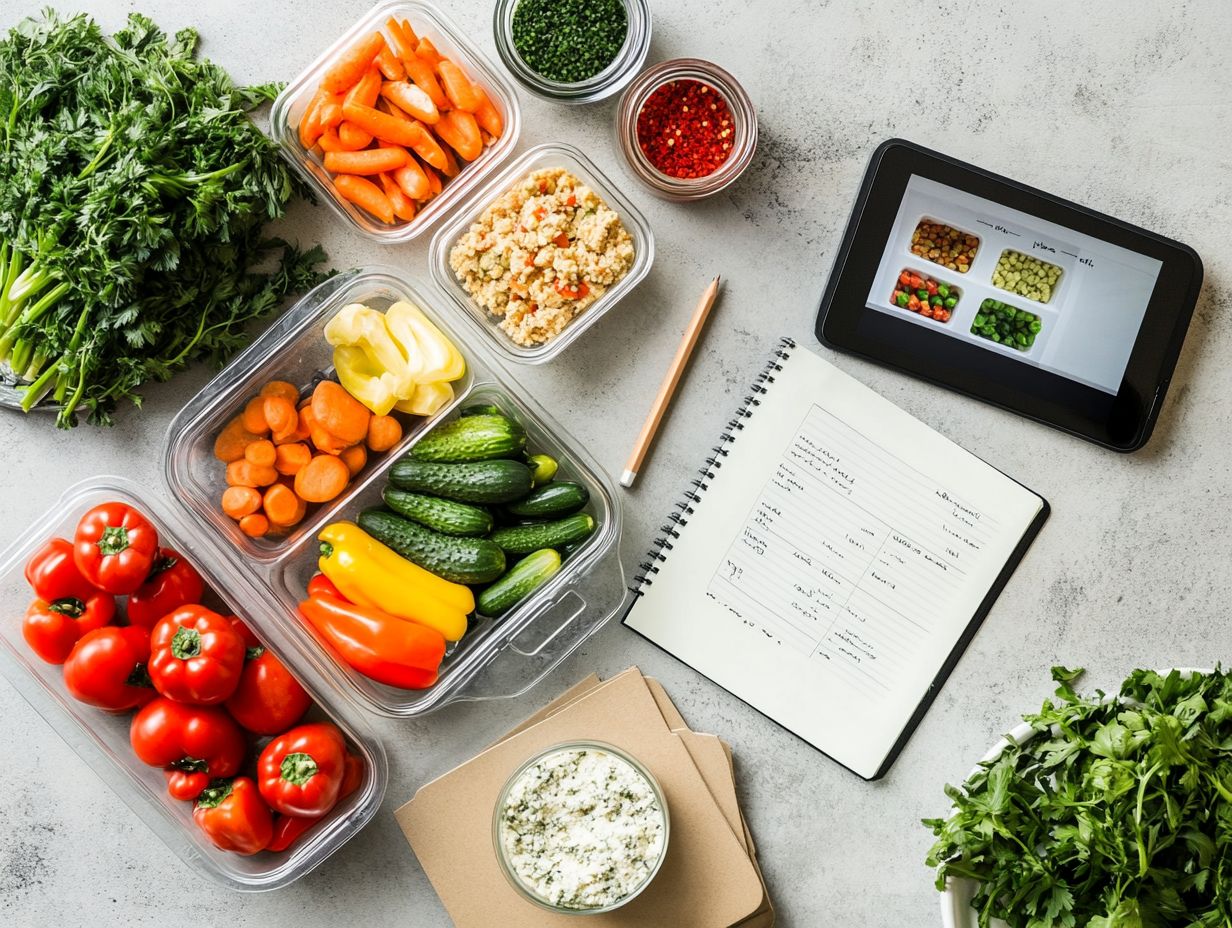
Accountability is essential for effective meal planning, especially when you re a busy parent striving to maintain a balanced diet and offer variety at the table. Establish clear expectations within your family regarding who s responsible for what in meals and cooking.
Involving every family member in the meal planning process fosters a sense of ownership and sparks creativity in selecting nutritious options. Rotate cooking days or invite the kids to join you on grocery trips to cultivate a collaborative environment.
Allowing flexibility in meal choices accommodates individual preferences. This makes it easier for everyone to embrace healthy eating habits without feeling restricted or pressured.
Meal Planning for Specific Diets and Preferences
Meal planning tailored to specific diets and preferences is crucial for families accommodating a range of dietary needs, such as vegetarian, gluten-free, and peanut allergy considerations.
By integrating various meal ideas and versatile ingredients, you ensure everyone enjoys flavorful and nutritious dishes that align with their health requirements.
This approach makes sure everyone enjoys their meal and fosters a sense of inclusivity at the dinner table.
Vegetarian, Gluten-Free, and Family-Friendly Options
Incorporating vegetarian and gluten-free options into your meal planning ensures that everyone can relish satisfying and nutritious meals. Explore easy-to-prepare recipes to uncover delicious dishes that cater to different dietary preferences without sacrificing flavor or convenience.
Get ready to whip up vibrant vegetable stir-fries, hearty soups, and delectable salads that satisfy diverse tastes while promoting healthy eating habits. Options like quinoa bowls, a protein-rich grain, brimming with fresh produce and aromatic herbs, along with playful bean-based tacos for a fun dinner night, make crafting meals everyone adores effortless.
This approach transforms meal planning into an enjoyable family activity where nutritious choices take center stage, fostering a sense of togetherness and well-being.
Frequently Asked Questions
How can I plan meals for a busy week?
1. Start by creating a meal schedule: Decide on the number of meals you will need for the week and plan which meals you’ll have each day. For more effective strategies, consider exploring meal planning tips for busy families. This helps you stay organized and avoid last-minute scrambling.
2. Make a grocery list: Once you have your meal schedule, create a grocery list of all the ingredients you’ll need for the week. This saves time and ensures you have everything you need for your meals.
3. Prep ahead of time: To save time during the week, prepare some ingredients or meals in advance. Chop vegetables, marinate meat, or cook a large batch of soup or stew to freeze and reheat later.
How can I ensure variety in my meals?
Mix and match ingredients. Use similar ingredients in different ways throughout the week. For example, if you have chicken on Monday, use the leftovers for a delicious chicken salad on Tuesday.
Incorporate theme nights. Assign fun themes to each day, like Meatless Monday or Taco Tuesday. This will spice up your meals and make planning a breeze!
Experiment with new recipes. Planning meals for a busy week doesn’t mean sticking to the same dishes. Try new recipes to keep your meals exciting!

